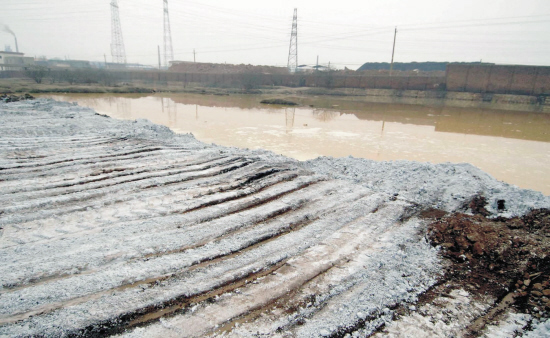Schemes launched to tackle soil pollution in Hunan
 0 Comment(s)
0 Comment(s) Print
Print E-mail Shanghai Daily, April 14, 2014
E-mail Shanghai Daily, April 14, 2014
The government has announced pilot projects to treat metal pollution in soil and prevent farmland from further contamination.
 |
|
Hunan was the source of rice containing dangerous levels of toxic cadmium sold in the southern city of Guangzhou last year. [File photo] |
The Ministry of Finance will subsidize soil pollution prevention and treatment in three cities in the central province of Hunan, media reported, as pilot efforts to halt developments that have rendered 3.3 million hectares of farmland too polluted to grow crops on.
Hunan was the source of rice containing dangerous levels of toxic cadmium sold in the southern city of Guangzhou last year.
Under the plan, the Ministry of Agriculture will monitor and control metal residues to prevent them from leaking into the soil, while the rice crop will be replaced with cotton and other non-edible products.
But government efforts to protect agricultural and urban soil fall massively short of what is needed, said Lan Hong, a professor at Renmin University's School of Environmental and Natural Resources.
In the current five-year plan, the Ministry of Finance has budgeted 30 billion yuan (US$4.8 billion) in spending on soil pollution prevention efforts, but Lan said it would cost at least 140 billion yuan, nearly five times above the budget, to solve the problem.
"The funding is based on data from the Ministry of Environmental Protection, but it is at the lower end of estimates. Some of the environmental damage will only be exposed after many years," Lan said.
Decades of unrestrained economic growth has hit China's environment hard, and news of hazardous pollution levels in food has become common in recent years.
The government has announced a series of plans and policies to combat soil pollution, but big polluters and growth-obsessed local officials are often reluctant to comply.
A soil pollution law is being prepared but Lan said the draft failed to clarify who would be liable when extreme incidents occur. Existing standards for industrial soil pollution differ from soil quality standards, casting doubt over which rules to follow and who is to blame.
"The regulations make it hard for courts to rule on penalties and compensation. It should tighten regulation on industry," Lan said.
In China, thousands of farms operate near chemical plants, mines and other heavy industries, increasing the risk of soil contamination.
Rapid urbanization adds to the problem, as residential areas are often built on top of former waste dump sites, raising concerns over polluted drinking water.





